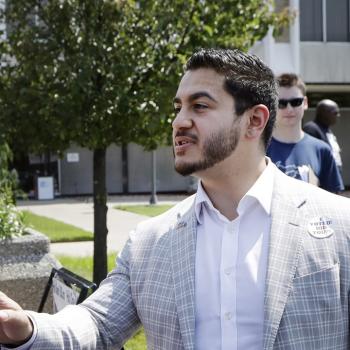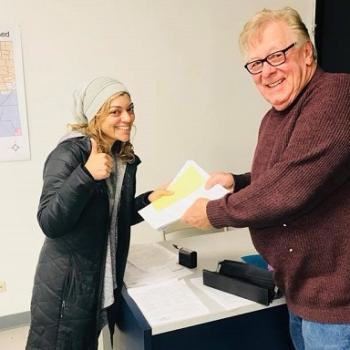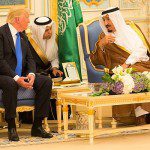 |
|
She’s listening
|
When Farah Pandith prepared to leave her position as senior advisor on Muslim affairs covering the European region for the State Department, in advance of President Barack Obama’s inauguration, she wanted to be sure the new administration had a chance to hear about the way in which America engaged with European Muslims and why. Pandith had been leading the effort in Europe on Muslim engagement, one in which the US government facilitated rather than dictated to Muslim communities. Her success was so notable that incoming Secretary of State Hillary Clinton made her an offer she couldn’t refuse. Instead of departing government service as planned, where she was keen on writing a book and doing continued research on Muslims in Europe, a new position and budget was created for her – Representative to Muslim Communities – leaving Pandith with a new vehicle for expanding her thoughtful initiatives to Muslim communities outside Europe. Here, in her first official interview in her new role, Farah Pandith speaks to us about her plans for expanding her programs, the opportunities for lateral engagement between Muslim communities worldwide, and what it means to be an American Muslim representing the United States.
![]() You’ve been involved with this issue with the State Department for many years, doing a lot of this work outside the public eye. Until this point, what has been your history working with the government and the State Department on issues related to Muslims around the world?
You’ve been involved with this issue with the State Department for many years, doing a lot of this work outside the public eye. Until this point, what has been your history working with the government and the State Department on issues related to Muslims around the world?
Farah Pandith: That’s a really good question, because I think one of the strengths I bring to the table is a wide variety of perspectives from government. People have a concept that there’s only one way of doing things and this is “the way.” But I think that the arm of the American government is so multi-faceted and should be used in ways that are not traditional but effective and necessary. I have worked in three very different arenas.
My experience at the United States Agency for International Development in 2003-2004, as well as my experience with them in the early 90’s, showed me first hand what the might of the government could be on the ground with economic and humanitarian aid, how NGOs on the ground were making a difference on a community level, how the American government actually interfaced in parts of the world that are very difficult. So that was an important perspective and gave me a really good foundation.
From 2004 to 2007, I was at the National Security Council at the White House. That allowed me to see policy at the highest levels. It allowed me to work on the staff of the NSC where we were responsible for coordinating policy across every agency and department. So you can see on the issue of Muslim engagement not just what one agency is doing, but everyone.
So, for example, how do you use the power of the Department of Treasury or Department of Commerce or the State Department to leverage the kinds of things that you want to see happen on the ground – and that’s what the NSC does in part. It gave me a large frame from which to think about an issue; you actually make a difference in the way policy is shaped and formed and talked about because it goes directly to the National Security Advisor. There, I learned a lot about how to do things.
In 2007, the Danish cartoons crisis happened. I was still at the White House when this happened and I was asked to go with the Assistant Secretary for Europe to meet with the Danes and others, to have them understand the sensitivities of this complex issue. And looking back on it, we realize how important and how pivotal that moment in time was for our nation. What happened in Europe made a difference to what’s happening all over the world in terms of perceptions of Muslims and what people could do.
I’m mentioning that point because it was a change for me… it moved me from the White House to the State Department in the months that followed because Assistant Secretary Dan Fried asked me to come over and created a senior position for me in the Europe bureau, because our government said – for the first time in history – while we have outreach to ethnic communities in Europe and have for decades, we understand that there are 20 million Muslims in Western Europe. What are we doing to get to know them? How are we going to build relationships with the next generation? You don’t want to do that only in a time of crisis. We want to do that in a time of non-crisis.
So they created the position for me where I interfaced on the ground for two years with European Muslims and my counterparts in government. It taught me a lot. It taught me about the diversity of the issues that are happening in Europe, but it allowed me because of my experience at the NSC and AID, how to use what I see on the ground to effect how we do things in Washington and how we seed initiatives, so I can bring back ideas and actually get the right players on the ground to actually make things happen in Europe.
I have a philosophy – it’s not about how much credit you get. It’s not about the American flag being waved everywhere. It’s about us getting to know people and actually listening to what is need, take action, and develop partnerships. For example, when I heard technology entrepreneurs in Europe say [they] don’t know each other… because I was on the ground and I was meeting people in a lot of different countries, I was able to see that the person in Copenhagen needed to meet the person in Madrid, the person in Madrid needed to meet the person in Milan. And you facilitate that and you walk away. Networks are created, change happens.
![]() What did you bring to the table that was different and unique in terms of what had been done previously with respect to relations between the US and other Muslim communities?
What did you bring to the table that was different and unique in terms of what had been done previously with respect to relations between the US and other Muslim communities?
In the past, when were talking about engaging with Muslims, it was sort of traditional methods – exchange programs, speakers that came from America and talked about a book or a new program they were doing, iftar dinners in our embassies, all of which are really, really important.
What I did that was different was to provide for the State Department – for our bureau – a high level interest in European Muslims so that all day, every day, when I woke up, all I was thinking about was this particular portfolio. And that’s the same thing, by the way, at the NSC. This was not some side job that was part of their portfolio – this was somebody who was waking up in the morning and saying, “What can I do to make this space and my task… how can I deliver?”
For me, delivery in Europe meant building teams on the ground with partners and our embassies and a lot of time in local communities there. It was using my understanding about the public and private sector. I worked in the private sector before I came to government, so I know what corporations can do. I was Vice President for International Business for a company in Boston. And I know that the private sector actually has to play a part. I sit on a lot of non-profit boards. I know what philanthropy can do. What educational institutions can do. But also what individuals can do.
So, what I brought to the table in Europe was a partnership with private sector/public sector/government. This was a partnership with all kinds of Muslims, some of whom are heads of organizations, some that are not, some who are interested in working on elite issues on the side, but had no access to the US government.
![]() So you’ve spent a lot of the last 18 months aggressively trying to get Muslim Americans involved in this effort…
So you’ve spent a lot of the last 18 months aggressively trying to get Muslim Americans involved in this effort…
I’m glad you brought that up because it’s one of many things that we did. Here’s what I heard when I was on the ground in Europe: How do we balance our identity? How can we be both Muslim and Western? How did American Muslims do this? And how can you not like the policies of your government and still be a proud American? What’s the real story about Muslim Americans? Why should government be telling that story? It should be American Muslims themselves telling that story.
So we created a tweaked tool to help get American Muslims out there in a way that was very effective – and fun. Over the course of 14 months, we hit 15 countries in Europe where we brought teams of American Muslims – teams of four where we had an American Muslim student, an imam, and two others – to a series of countries for 3 or 4 days and do all sorts of things. Round table discussions, town halls, interfaith, going to mosques and community centres.
And so these American Muslims had an exposure across Western Europe. It was fantastic. We want to expand that kind of thing. We want to bring American expertise and understanding. What I’ve heard from American Muslims also was, “How can we help with the global agenda of pluralism, understanding, innovation and discourse?” And I think we need to honor that.
How can Muslim Americans help? In many ways, is the answer. Let’s find ways which we can do that.
![]() Let’s fast forward to today. You had done this work with the State Department with Muslims in Europe and then all of a sudden, there’s an announcement that you’ve been appointed in the Obama administration to continue that work, but at a larger scale. How did that happen? It’s very rare that people who worked in a previous administration get validated and appointed to continue their work in a new administration.
Let’s fast forward to today. You had done this work with the State Department with Muslims in Europe and then all of a sudden, there’s an announcement that you’ve been appointed in the Obama administration to continue that work, but at a larger scale. How did that happen? It’s very rare that people who worked in a previous administration get validated and appointed to continue their work in a new administration.
It was really funny for me because I had made plans to leave by the beginning of February. I came into government through a funny mechanism, which is for an area expert.
![]() It was not a political appointment?
It was not a political appointment?
No. When I came to government in 2003 it was not a “political appointment.” My journey into government from college was — way back in 1990 – when I gave a speech on the importance of respect and diversity as student body president at Smith College and the then First Lady, Barbara Bush, like it and asked me if she could have a copy. Her kindness upon graduation from college moved me into Washington but then after grad school and seven years in the private sector, 9/11 happened. I wanted to serve my nation. I came in and I was doing my thing and the end of my time was in place. Almost a year ago, I gave my word to a think tank in Washington to create a platform to do something I really wanted to do, which was to write a book, do some media, and to find a place where I could actually write and do other things. I was going to start in March 2009.
What happened was I was still at the State Department when the new team came in and I was really excited… I wanted to be able to tell the new Assistant Secretary for Europe, “Hey guys, pay attention to this. These are the kinds of things that are going on in Western Europe. Continue with this program.” I gave him names of people that actually should go forward and take on this thing.
I was set to leave and the Secretary of State was being briefed in late January by the Europe bureau on what was taking place. I came to the briefing to give her an indication about European Muslims and the kinds of programs we did. And much to my surprise and honor, during the course of that briefing, she was unbelievably interested in the kinds of programs we put together, because she thought they were innovative. She thought they were creative. So many networks and new partnerships and programs… We built 20 initiatives in the course of 17 months. It was finding ways to facilitate and build networks that never existed. It was reaching out to the next generation in different ways so that we could engage and partner.
We wanted to do things from a local level and use this experience. We wanted programs that would be would be long lasting and organic. And for me, one of the successes of anything that we do is to seed something organically. To act as a facilitator, a convener, an intellectual partner. And then walk away. There’s no need for the American flag to be flying everywhere. There are smart people on this planet. Let’s listen to them. Let’s hear what the local person on the ground has to say. Let’s marry their ideas and needs with somebody else who has done it before. Let’s use the American government that way. Act as a convener, and then let it grow and not be involved in every aspect of its growth.
So, I had the opportunity to explain to Secretary Clinton what we did. She was very engaged. She got it. And then she asked me at that meeting to stay. I told her I was leaving to go to the Washington Institute. And she said she didn’t want me to leave. She said she wanted to leverage the kinds of things we were doing in Europe around the world.
![]() Without getting into specifics, what are the challenges you see in taking something that was designed for Muslim communities in the West and extrapolating that to the larger Muslim world?
Without getting into specifics, what are the challenges you see in taking something that was designed for Muslim communities in the West and extrapolating that to the larger Muslim world?
Right. Well, I think that it’s really important that we understand what her vision is for this role. This isn’t simply making everybody love us, that’s not what this job is.
![]() There’s some confusion that this is similar to Karen Hughes’ public diplomacy role, which was seen by many as trying to make people calm down but not really do anything substantive in terms of relationship building.
There’s some confusion that this is similar to Karen Hughes’ public diplomacy role, which was seen by many as trying to make people calm down but not really do anything substantive in terms of relationship building.
If you look at the kind of work I did in Europe, you would know firsthand, from European Muslims as well as others, that it wasn’t about going in and saying “you must love us.” There are significant and important grievances from all pockets around the world in different communities, and it’s important to have those conversations and hear what they are and not dismiss what is being said. But at the same time, this position has been created to seed new initiatives around the world that will allow us to build connections in ways that we haven’t, to connect like-minded thinkers who are doing cool things, and to build up communities organically.
One of the things that was most inspiring to me in Europe was to find people who had the neatest ideas in the world and realize, “My God, they don’t realize how great this is – why don’t we connect it with someone who is doing this somewhere else?” The great thing about this role is that you will be able to do this now globally. If you meet the person in Uzbekistan who has a really neat concept that is going to work for someone in Malaysia, why not connect them? I’m not dismissing the opportunity to talk and have serious conversation, but I’m not going out of the gate with any kind of idea that I’m supposed to put forth an agenda and have everyone love us…
![]() So that’s not your metric for success?
So that’s not your metric for success?
If we can seed new initiatives that allow people to talk to each other and to talk to us in new ways, to facilitate and build stronger communities on the ground, to use the might of the US government to help connect great ideas, we will have succeeded.
![]() What kind of resources are you being given by the State Department to carry out this mission, and what can Muslim Americans do to contribute to that effort?
What kind of resources are you being given by the State Department to carry out this mission, and what can Muslim Americans do to contribute to that effort?
I will have my own budget, which will be significant, and we will be leveraging the might of the State Department. This is the Secretary’s priority, this is very important to her. In terms of [Muslim Americans], I’m going to try to find an access route to make good ideas come to us. I want to have consistent dialogue with American Muslims, and I will do that face to face. The reason I was successful in Europe is because American Muslims helped me become successful. This was not something you just do alone – you’ve got to work with teams of people that are smart and bright, and have the ambition to build stronger communities. That’s what I’m all about.
Shahed Amanullah is editor-in-chief of altmuslim.com











